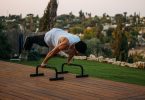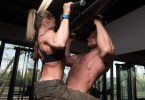Do bodybuilders age faster? This is a question that has been asked by many people, and the answer is not completely clear.
There are many factors that play into how muscles affect lifespan. In this blog post, we will explore the research on this topic and try to answer this question once and for all!
Multiple studies have found that males who regularly exercise (including weightlifting) have the appearance of being significantly younger than their actual age. When looking at the numbers more closely, you’ll notice that the same guys also have more consistent and positive emotional states.
After the age of twenty-five, most people experience a gradual loss of muscle mass. However, you are able to stop the process of “wasting away” by engaging in bodybuilding. It is one of the most effective “anti-aging” medicines that may be obtained by anyone, regardless of gender.
On the other hand, if taken to an extreme, bodybuilding can speed up the natural aging process and potentially increase the risk of dying prematurely.
I was listening to some music when I came across a phrase that said, “too much fat or fat-free mass can be hazardous.”
After more reflection, I realized that these words were not meant to be taken in a flippant manner. It would appear that the majority of serious weightlifters value having a large amount of muscle. Their point of view is that there is nothing wrong with achieving one’s full genetic potential in terms of size.
Is body building an anti-aging technique?
Being muscular is not a problem at all, that much is clear. However, a body that is described as “heavily muscled” can provide an issue.
When it comes to any activity, there is an ideal level of hypertrophy that should be obtained, and having an excessive amount of mass, whether it comes from fat or muscle, may be quite damaging.
Having too much muscle places a significant burden on the body and has the potential to shorten one’s life, particularly in cases where there is a hereditary predisposition to cardiovascular disease.
Every pound of extra flesh requires hundreds or thousands of new capillaries to carry blood to nourish it, which puts a strain on your organs including your heart, lungs, stomach, liver, and kidneys, as described in Harry Pascal’s book “Muscle moulding.” If you allow yourself to get overweight, any insurance company will show you conclusively that you are giving up a substantial number of years of healthy living. Showcase muscular ‘lumps’ could be just as lethal as ordinary fat accumulations.
There are some other health concerns that should be taken into consideration as we age. For example, high-intensity strength training can also put undue stress on our joints and connective tissues, which can lead to injuries
Another possibility is that the use of steroids and other performance-enhancing drugs may contribute to faster aging. In general, it is thought that bodybuilders who uses steroids age at a rate somewhere between 10-20% faster than the average person.
Some people age more quickly than others, and this may be due in part to their genes. However, lifestyle factors can also play a role in aging. Certain behaviors and habits can accelerate the aging process, while others can slow it down.
What is threshold level for a safe muscle mass
Individuals will have different thresholds for what constitutes “safe” muscle mass, but I think most can tell when they’ve gone too far. After a certain threshold, additional stress is perceived as “weighted down” by the body and its systems.
An under-6-foot-tall, close-to-300-pound (or more) “heavily-muscled” person may be at risk if they continue to bear that weight for an extended period of time. If there is a family history of heart disease, taking medication can only make things worse. Some of the premature deaths of prominent athletes in the strength world may be attributable to this.
If that isn’t enough to encourage you to tone it down a notch, research suggests that having too much muscle mass can really be detrimental to performance.
However, that shouldn’t stop you from trying to grow muscle; just don’t go overboard for too long. When performed correctly, bodybuilding can be an effective anti-aging strategy. You’ll get a taste of how effective bodybuilding is in reversing the effects of time tomorrow. It will likely serve as a source of motivation for you.
What happens to bodybuilders as they age?
As of right now, there has been no discernible weakening in overall strength. Noticing no reduction in muscle mass. Here, though, is what transpires with age.
- Although your muscle mass and strength may increase, your tendons will become less flexible. This means that you should avoid doing any kind of ‘ballistic, jerky stuff,’ and should especially avoid trying any kind of’max lifts,’ since these will increase your risk of injury. So, proceed slowly, maintain proper form, and avoid bouncing and jerking. Lifting heavy is fine, but not to failure. After the age of fifty, you begin to notice this suppleness.
- Your capacity for withstanding stress may be deteriorating. Lifting heavy for long periods of time can cause fatigue and muscle fatigue.
- More downtime may be required in between therapy sessions. In other words, the soreness you feel after a workout is more prolonged.
Is body building detrimental to the heath in general?
No. However, genetics, prolonged untreated high blood pressure, and liver disorders all play a role in how quickly a bodybuilder ages after using anabolic steroids.
Those who rely on insulin and synthetic morphine are in an even more dire situation. There is a possibility that their veins won’t mend properly, leading to complications like diabetes and uremia later on.
Despite the dangers of “reducing” body fat to below 5%, these issues are uncommon among natural bodybuilders.
Do so many bodybuilders die young (before their 60s)?
There is a high mortality rate among bodybuilding professionals.
Diuretics used on the day of contest, medicines that increase the risk of heart attack (anabolic/androgenic steroids), and a diet high in red meat and low in vegetables all contribute to this.
Can muscular mass be gained beyond 50 years of age?
Put simply: Absolutely. “Yes, absolutely, yes—100% yes,” Lobert stresses. One study found that you only need 40 minutes of weight training twice a week to achieve this. Muscle mass increased at the same rate in persons of all ages, from young to old.
Comparable to the effect of exercise on osteoporosis, sarcopenia can be delayed by engaging in physical activity, according to the research of Lam-Feist. Frailty, brought on by muscle atrophy, increases the risk of falling and breaking a bone.
Many people who are frail have trouble eating well, which can lead to problems with their balance and gait, as well as mental decline. According to Lam-Feist, this data demonstrates the critical role that exercise plays in ensuring long-term health, mobility, and bone density. Further, this loss of muscle mass can be avoided.
In conclusion, when compared to the general population, bodybuilders do not show signs of accelerated aging; on the contrary, they tend to be healthier and appear younger. If you’re a bodybuilder, going natural and staying off steroids is your best bet for a long, healthy life.







